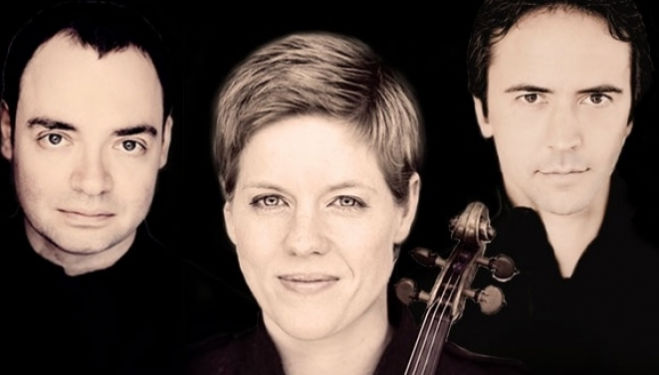
In 2009, the Pavel Haas Quartet were one of
BBC Radio 3’s New Generation Artists, young upstarts only just making their way
to international acclaim. A few years later, and they have become one of the
most celebrated chamber groups in the world, with four Gramophone Awards, including one for Recording of the Year. Their ascent may seem miraculous, but
it is entirely earned: melding thrilling virtuosity with warmth and precision,
the four musicians possess a rare synchronicity. It as if they play as one
body, led by Veronika Jaruskova’s violin but with equal weighting between all
four.
This February, as part of the Barbican’s 2015/16 season, they have been invited to hold a BBC Radio 3 Lunchtime Residency for an unprecedented second time. Over four Thursdays, they will play at LSO St. Luke’s, which possesses some of London’s very best acoustics.
The first recital, on 4 February, presents both Smetana’s String Quartets (1876; 1883). Composed by the ‘Father of Czech Music’ as he realised his incipient blindness, No. 1 was the first autobiographical string quartet ever written. No. 2 dates from a darker time still, when Smetana’s mental wellbeing had severely declined and he was on the verge of being committed to an asylum. Both are penetrating and wrenching, with grippingly vivid passages and an acute sense of life’s fragility. The Pavel Haas Quartet’s recent recording of both won critical accolades and their fourth Gramophone chamber award.
After this stormy start, the residency continues on 11 February with Prokofiev’s String Quartet No. 1 (1931) – which begins with a lively urgency before a sublimely melancholic finale – and Bartok’s String Quartet No. 5 (1934), inarguably one of the highlights of the modern chamber repertoire.
The third concert on 18 February continues this twentieth-century focus with two pieces from Shostakovich. It begins the uncompromising, mournful and terrifying String Quartet No. 10 (1964), a work of boundless complexity. It will be balanced with the Piano Quintet (1940), an exciting and accessible piece that remains one of its composer’s most popular. Russian pianist Denis Kozhukhin will join the quartet.
The series draws to a close on 25 February with one of the undisputable peaks of chamber composition, Schubert’s String Quintet (1828). The young romantic’s final work in the genre, it runs for almost an hour, passing through some of the most sublime melodies ever plucked from music’s possibilities. German cellist Danjulo Ishizaka will join the quartet for what looks to be a stiring close to their season.
This February, as part of the Barbican’s 2015/16 season, they have been invited to hold a BBC Radio 3 Lunchtime Residency for an unprecedented second time. Over four Thursdays, they will play at LSO St. Luke’s, which possesses some of London’s very best acoustics.
The first recital, on 4 February, presents both Smetana’s String Quartets (1876; 1883). Composed by the ‘Father of Czech Music’ as he realised his incipient blindness, No. 1 was the first autobiographical string quartet ever written. No. 2 dates from a darker time still, when Smetana’s mental wellbeing had severely declined and he was on the verge of being committed to an asylum. Both are penetrating and wrenching, with grippingly vivid passages and an acute sense of life’s fragility. The Pavel Haas Quartet’s recent recording of both won critical accolades and their fourth Gramophone chamber award.
After this stormy start, the residency continues on 11 February with Prokofiev’s String Quartet No. 1 (1931) – which begins with a lively urgency before a sublimely melancholic finale – and Bartok’s String Quartet No. 5 (1934), inarguably one of the highlights of the modern chamber repertoire.
The third concert on 18 February continues this twentieth-century focus with two pieces from Shostakovich. It begins the uncompromising, mournful and terrifying String Quartet No. 10 (1964), a work of boundless complexity. It will be balanced with the Piano Quintet (1940), an exciting and accessible piece that remains one of its composer’s most popular. Russian pianist Denis Kozhukhin will join the quartet.
The series draws to a close on 25 February with one of the undisputable peaks of chamber composition, Schubert’s String Quintet (1828). The young romantic’s final work in the genre, it runs for almost an hour, passing through some of the most sublime melodies ever plucked from music’s possibilities. German cellist Danjulo Ishizaka will join the quartet for what looks to be a stiring close to their season.
| What | Pavel Haas Quartet, LSO St. Lukes |
| Where | LSO St. Luke's, 161 Old Street, St. Luke's, Islington, London, EC1V 9NG | MAP |
| Nearest tube | Old Street (underground) |
| When |
On 04 Feb 16, 1:00 PM – 2:00 PM On 11 Feb 16, 1:00 PM – 2:00 PM On 18 Feb 16, 1:00 PM – 2:00 PM On 25 Feb 16, 1:00 PM – 2:00 PM |
| Price | £12 |
| Website | Click here to book via the Barbican website |




